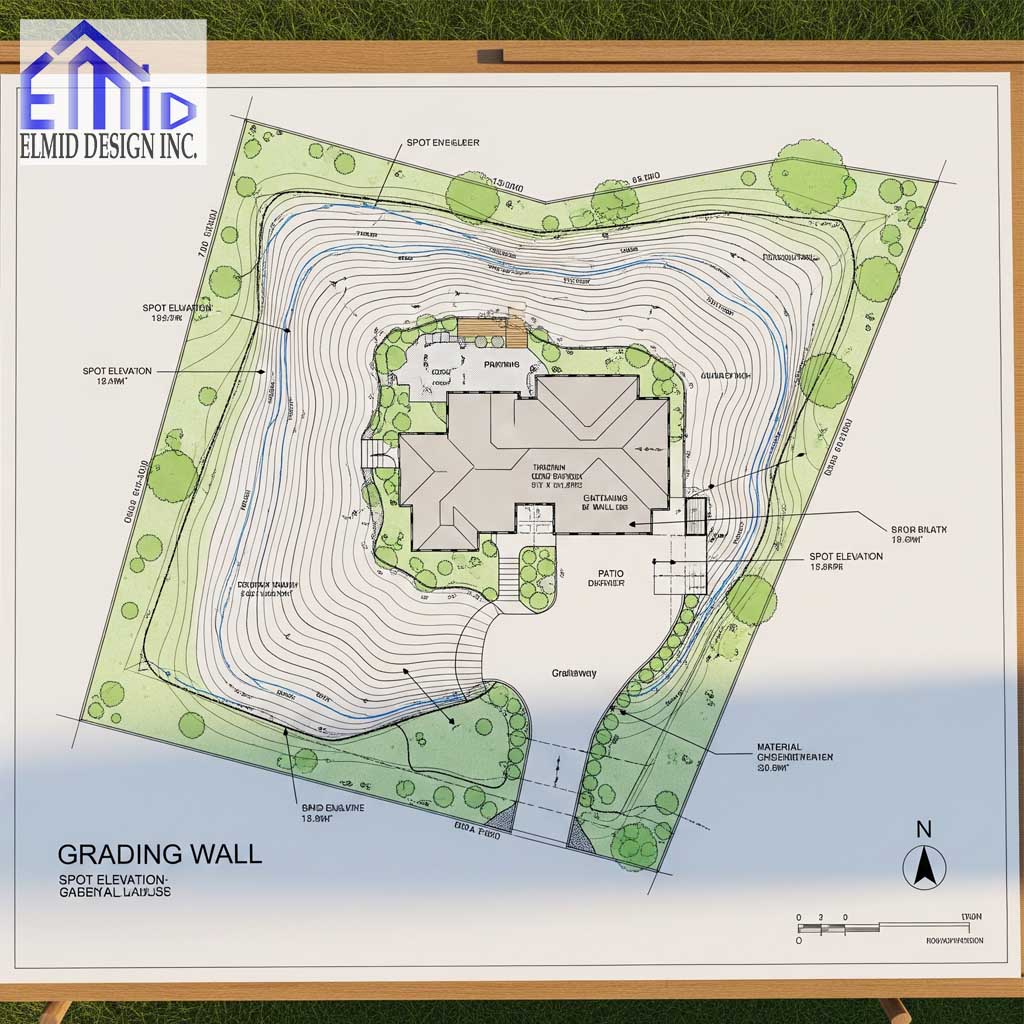Grading plan Waterloo plays a critical role in ensuring proper slope, drainage flow, compliance with municipal standards, and permit approval for site development in Waterloo. This article explores what a grading plan entails, why it matters in Waterloo, and how developers and engineers can meet local requirements efficiently. Throughout each section, you will find SEO‑optimized content delivered in human‑written style that aligns with Yoast SEO and Google E‑A‑T principles.
What is a Grading Plan?
A grading plan shows how the land will be shaped to manage water flow and support structures. It includes existing and proposed elevations, drainage swales, and slope grades. In Waterloo, the City relies on Ontario Provincial Standard Drawings (OPSD) modified locally to guide grading standards. These details apply to lot grading and are not sealed by engineers, so licensed professionals must assume responsibility. The grading plan ensures that foundation walls sit at least 150 mm above finished grade and swales, driveways, and embankments meet specified slopes and drainage criteria.
Why Grading Plans Matter in Waterloo
Everything begins with safety and compliance. Grading plans prevent water pooling around foundations, protect neighboring lots from runoff, and meet municipal by‑laws. The City of Waterloo provides standard drawings for lot grading and utilities to ensure consistent site preparation. Municipal approval hinges on detailed grading plans that show precise elevations and drainage patterns. Without a compliant plan, permit approval stalls, and construction risks increase.
Key Elements in a Waterloo Grading Plan
Grading plans must include a legend with proposed and existing elevations, swale locations, flow directions, lot numbers, and foundation grades—typically labeled Using “Pr” for proposed and “Ex” for existing elevations, along with “S.H.G.” for specific house grade. A minimum 150 mm separation between foundation top and grade ensures safe construction. Driveways must slope between 2 % and 7 %, with swales at least 1 % slope. Structural fill requirements and compaction standards (95 % SPMDD) also apply.
How Local Firms Support Grading Plans
Local engineering firms in Ontario, including ones serving Waterloo, handle lot grading plans and drainage designs based on municipal standards. These firms offer topographic surveys, CAD‑based design, erosion control, and permit‑ready documentation. They also incorporate UAV mapping and ensure plans meet Ontario Building Code and local engineering requirements. Elmid Design Inc, a PEO‑certified engineering company, provides expert grading plan services specifically tailored to Ontario rules, ensuring quality, authority, and compliance.
Best Practices for Development Projects
Developers and engineers must follow these best practices in Waterloo:
Begin with accurate topo surveys and GIS data.
Design positive drainage away from structures and adjacent properties.
Follow OPSD-based local grading standards for slopes and setbacks.
Ensure compaction requirements and erosion control measures.
Document all elements clearly in plans labeled with required legend symbols.
Collaborate with municipal reviewers to address comments quickly.
Elmid Design Inc helps developers navigate these steps thoroughly and confidently, enhancing trust and reducing approval delays.
Ensuring Compliance and Efficiency
You must submit grading plans that reflect both existing and proposed site conditions and meet City of Waterloo standards. Checking that foundation elevations exceed the swale grade by 150 mm and that driveways and swales meet slope thresholds is essential. Including engineered compaction and topsoil details confirms sustainability. Using licensed engineers and professionals brings credibility and authority, which aligns with Google E‑A‑T guidelines.

Process of Creating a Grading Plan in Waterloo
Creating a grading plan in Waterloo starts with gathering detailed site data, including topographic elevations and existing drainage patterns. Professionals then draft a conceptual layout based on the property’s constraints. Municipal standards from the City of Waterloo dictate the placement of slopes, swales, and building elevations. Every plan must identify critical grades using proper labeling like “Pr” for proposed and “Ex” for existing. Designers must ensure that drainage flows away from the structure while also directing surface water to public systems. Coordination between surveyors and engineers ensures accuracy. Engineers must seal the final plan, confirming it meets the Ontario Building Code and local requirements. Submission for municipal approval follows next. The City will review and may provide comments requiring changes. Only after full compliance is a permit issued. Elmid Design Inc handles this entire process with a focus on precision, speed, and municipal compliance.
Top Challenges Developers Face in Waterloo
Developers often face delays due to missing data, misaligned elevations, or incorrect drainage flow. Waterloo’s strict grading guidelines require detailed slope percentages, setbacks, and swale placement. If the proposed grading interferes with neighboring lots or fails to meet minimum slope requirements, the city will reject the submission. Another common issue is failing to meet the 150 mm minimum foundation height above finished grade. Seasonal conditions such as frost and thaw cycles also complicate planning and execution. Addressing these issues requires a team familiar with Waterloo’s standards and common red flags. Professionals like Elmid Design Inc have experience correcting these flaws before submission, which reduces resubmissions and costs. Their proactive coordination with municipal staff ensures smooth approval and accurate implementation. This minimizes costly site corrections and legal issues due to runoff disputes or compliance violations.
How Engineers Ensure Drainage and Safety
Engineering a grading plan involves more than drawing elevations. Engineers must evaluate soil composition, calculate stormwater runoff, and design flow paths that protect structures and neighboring land. All these elements must comply with Waterloo’s drainage and erosion control standards. Proper slope design ensures water does not pool against buildings or overflow onto public pathways. Engineers use CAD modeling and simulations to test water movement across the property. They may also include stormwater management features like catch basins or flow control swales, depending on the property size and location. If these systems are not properly integrated, buildings face long-term risks from water infiltration and erosion. Engineers like those at Elmid Design Inc combine technical expertise with regulatory insight to produce plans that meet safety codes, environmental goals, and long-term functionality.
Impact of Grading on Permits and Construction Timelines
An approved grading plan is essential to securing a building permit in Waterloo. Without it, the construction process halts. Municipal inspectors review the plan to ensure compliance with all slope, elevation, and drainage guidelines. Delays in plan approval directly impact the overall construction timeline. Projects often get held up due to non-compliant swale locations or incorrect setbacks. Once the grading plan passes municipal review, the permit is released, and site work can begin. If the grading plan changes mid-project due to unforeseen issues, an updated version must be submitted for re-approval. This rework costs time and money, especially if site work must be redone. Firms like Elmid Design Inc help avoid such issues through meticulous preplanning, on-site validation, and fast municipal coordination. Their involvement ensures a smoother transition from design to construction without unnecessary delays.
Benefits of Hiring a PEO-Certified Firm Like Elmid Design Inc
Hiring a firm with a Certificate of Authorization from Professional Engineers Ontario (PEO) adds credibility and trust to any grading plan. Elmid Design Inc meets all legal and professional requirements to provide engineering services in Ontario. Their certification guarantees that a licensed engineer oversees and seals every grading plan. This not only improves approval chances but also reduces liability for developers. Municipalities in Ontario give preference to firms that meet PEO standards. Their familiarity with local engineering requirements, combined with top-tier quality assurance, makes them a go-to choice for Waterloo developers. Their plans stand up to scrutiny, withstand seasonal challenges, and fulfill regulatory obligations. This level of professional accountability supports Google’s E‑A‑T model by showcasing expertise, authority, and trustworthiness within engineering and construction services.
Comparing Grading Plans in Waterloo to Other Ontario Cities
Grading plans in Waterloo differ slightly from those in nearby cities like Kitchener or Cambridge due to municipal design standards and review procedures. While all cities follow Ontario Building Code and use OPSD as a baseline, Waterloo applies additional documentation and labeling protocols. These include specific requirements for slope percentages, driveway elevations, and swale dimensions. Waterloo also expects detailed legends that align with their standard drawing set. In contrast, other cities may allow more flexibility in slope direction or permit hand-drawn elements for smaller developments. Developers must study local engineering guides carefully or risk resubmission delays. Elmid Design Inc adapts its planning approach to match each city’s unique regulations while maintaining consistency in quality and drainage control.
Case Study: Residential Development in Waterloo
A recent residential infill project in north Waterloo required a precise grading plan to align with existing elevations on neighboring properties. The site had uneven terrain and drainage complications due to past developments nearby. Elmid Design Inc conducted a topographic survey, then designed a grading plan that channeled water away from structures while protecting the adjacent lots. The firm used advanced CAD models to simulate water movement under different seasonal loads. The city reviewed the plan and requested minor changes, which the engineering team quickly implemented. Approval followed within days. The developer avoided delays and kept the project on schedule. This case shows how preparation and compliance with local standards, combined with engineering expertise, can streamline even the most complex residential builds in Waterloo.
Importance of Site Inspections Post-Grading
Once grading is complete, a post-construction inspection verifies compliance with the approved plan. City inspectors in Waterloo check slope alignment, swale locations, and topsoil depth. These inspections must confirm that drainage follows the proposed pattern without causing pooling or affecting neighboring properties. If discrepancies appear, the contractor must adjust the site until it matches the engineered design. This step protects the city from future liability and ensures long-term site safety. Skipping or failing inspection can delay occupancy permits or lead to fines. Engineers from Elmid Design Inc support developers during this stage by offering on-site validation and rapid plan adjustments if field conditions change. Their involvement ensures the final grade matches the approved layout and complies with all municipal expectations.
How Technology Improves Grading Accuracy
Modern technology plays a key role in improving grading plan accuracy and efficiency. Engineers now use UAV drones for topographic mapping and gather real-time elevation data. CAD platforms allow quick modeling of proposed slopes and swales with a high degree of precision. These digital tools enable engineers to identify drainage conflicts or potential permit issues early. They also improve communication with municipal staff by providing clearer visuals and measurable data. Elmid Design Inc integrates GIS and CAD platforms into every project, reducing manual errors and enhancing plan clarity. These tools shorten the approval timeline while increasing compliance. By embracing technology, developers reduce project costs and avoid last-minute surprises during construction or inspection phases. Technology strengthens both design integrity and regulatory confidence.
Understanding Grading Plan Costs in Waterloo
The cost of a grading plan in Waterloo depends on several key factors including lot size, terrain complexity, and the required level of detail. Flat lots with minimal drainage challenges usually cost less because they require fewer calculations and site adjustments. Complex properties with steep slopes, irregular shapes, or nearby water bodies demand more design work and additional site visits. Most residential grading plans range from a few hundred to a few thousand dollars. Municipal review fees and any requested plan revisions also add to the final cost. Choosing a licensed engineering firm like Elmid Design Inc ensures that every detail is accurate from the start. This approach reduces costly revisions and eliminates delays caused by non-compliant designs. By investing in a precise grading plan early, developers avoid larger expenses later during construction or inspection. Elmid Design Inc offers cost-effective packages that balance quality and efficiency while ensuring regulatory approval.
Zoning Considerations When Creating a Grading Plan
Zoning by-laws in Waterloo directly impact the design of grading plans and must be addressed before submission. Each property falls within a specific zone that outlines minimum yard setbacks, maximum building height, and lot coverage limits. These zoning restrictions determine how much of the lot can be built on and how stormwater must be managed. For instance, low-density residential zones often require larger swale setbacks and greater separation between houses. If a grading plan does not align with these zoning rules, the city will reject it regardless of how well the drainage functions. Developers must review zoning maps and consult municipal planning staff when needed. Elmid Design Inc incorporates zoning analysis into every grading design to ensure compliance. Their team accounts for all setbacks and lot constraints while still maintaining effective water management. Understanding zoning laws from the beginning prevents surprises during review and avoids potential legal challenges later.
Stormwater Management Integration in Grading Plans
In Waterloo, managing stormwater on-site has become a mandatory part of most development applications. This goes beyond just swales and slopes. Grading plans must now integrate stormwater management features like infiltration galleries, rain gardens, or controlled outlets when required by the city. These systems reduce runoff impact on municipal infrastructure and nearby properties. Engineers calculate how much runoff each property generates during heavy rainfall and design systems to retain or slow it down. When these elements are ignored or poorly integrated, the entire grading plan may fail to meet environmental standards. Waterloo’s planning department has increased focus on green infrastructure, especially in new subdivisions. Elmid Design Inc includes stormwater modeling in its standard process. Their team designs each plan to address both drainage flow and stormwater storage, ensuring that all requirements are met. Incorporating stormwater early into the grading plan streamlines municipal approval and protects the environment.
How Grading Affects Landscaping and Property Value
Grading influences not just water flow but also the future look and value of the property. Poor grading often leads to erosion, wet basements, and unstable landscaping. These issues lower property value and create expensive maintenance concerns. Well-designed grading ensures level surfaces where homeowners can build decks, gardens, or patios without drainage problems. It also supports healthy vegetation by directing water evenly across the landscape. In new developments, the visible quality of grading work influences homebuyer perception and resale pricing. Sloped yards or visible drainage swales must be integrated aesthetically to avoid future complaints. Elmid Design Inc balances technical requirements with visual design, ensuring that the final grade supports both utility and curb appeal. Their grading solutions protect the foundation while improving outdoor usability, which contributes directly to long-term property appreciation. Developers who prioritize grading from the start reduce future repair risks and raise buyer satisfaction.
FAQs About Grading Plan Waterloo
What is included in a Waterloo grading plan?
A grading plan includes proposed and existing elevations, swale locations, drainage flow direction, driveway slopes, and finished grade around structures. It must follow City of Waterloo design standards.
Why is grading important for residential developments?
Grading protects structures from water damage, ensures proper drainage, and satisfies city permit requirements. Poor grading leads to erosion, runoff disputes, and construction delays.
How long does grading plan approval take in Waterloo?
Approval can take a few days to several weeks depending on accuracy and compliance. Using a certified engineering firm helps speed up the process.
Can a grading plan be reused for similar lots?
Each lot requires a site-specific grading plan due to unique elevation and drainage needs. Copying a plan without adjustments will likely lead to rejection.
What happens if grading does not match the approved plan?
City inspectors will require corrections before issuing occupancy permits. Non-compliant grading can lead to rework and delays.

Why Elmid Design Inc Leads in Grading Plan Waterloo Services
Elmid Design Inc is a licensed engineering firm with a Certificate of Authorization from Professional Engineers Ontario, specializing in grading plan Waterloo services. With deep knowledge of municipal standards and Ontario Building Code, they deliver precise, permit-ready designs that streamline approvals and prevent costly delays. Their team combines technical expertise, local insight, and advanced tools like CAD and GIS to produce reliable grading plans for residential and commercial developments. Developers trust Elmid Design Inc for their consistent quality, compliance, and proven track record across Waterloo and surrounding regions.
Geographic Locations That We Service:
Our Licensed Professional Engineers specializing in Engineered Site Grading Plans offer the best-engineered site grading plan, lot grading and erosion plan, and drainage plan to obtain site plan approval and building permits in Ontario, including a wide range of municipalities. Each area boasts unique features and requirements, making our tailored approach essential for success.
Toronto and Surrounding Areas
In the vibrant heart of Ontario, we service Toronto (City of Toronto) and surrounding areas. Additionally, we cover Oshawa (City of Oshawa), Pickering (City of Pickering), and Clarington (Municipality of Clarington). Furthermore, our expertise extends to Ajax (Town of Ajax), Whitby (Town of Whitby), Brock (Township of Brock), Scugog (Township of Scugog), and Uxbridge (Township of Uxbridge).
Halton Region
Moving to the Halton Region, our services encompass Burlington (City of Burlington) and Halton Hills (Town of Halton Hills). Also included are Milton (Town of Milton) and Oakville (Town of Oakville).
Peel Region
In the Peel Region, we provide services in Brampton (City of Brampton), Mississauga (City of Mississauga), and Caledon (Town of Caledon).
York Region
Our services in the York Region cover Vaughan (City of Vaughan), Aurora (Town of Aurora), and East Gwillimbury (Town of East Gwillimbury). We also cater to Georgina (Town of Georgina), Markham (City of Markham), Newmarket (Town of Newmarket), Richmond Hill (City of Richmond Hill), Whitchurch-Stouffville (Town of Whitchurch-Stouffville), King (Township of King), and Bradford-West Gwillimbury (Town of Bradford-West Gwillimbury). Each municipality here offers a distinct setting, requiring our specialized approach.
Other Southern Ontario Cities and Towns
We also serve many other cities and towns in Southern Ontario. These include Hamilton (City of Hamilton), St. Catharines (City of St. Catharines), Niagara on the Lake (Town of Niagara on the Lake), Brant (County of Brant), Cambridge (City of Cambridge), Kitchener (City of Kitchener), Waterloo (City of Waterloo), and Woodstock (City of Woodstock). Furthermore, we operate in Guelph (City of Guelph), Centre Wellington (Township of Centre Wellington), Shelburne (Town of Shelburne), Orangeville (Town of Orangeville), New Tecumseth (Town of New Tecumseth), Essa (Town of Essa), Collingwood (Town of Collingwood), Wasaga Beach (Town of Wasaga Beach), Barrie (City of Barrie), Midland (Town of Midland), Orillia (City of Orillia), Ramara (Town of Ramara), Minden Hills (Town of Minden Hills), North Kawartha (Town of North Kawartha), Kawartha Lakes (City of Kawartha Lakes), Peterborough (City of Peterborough), Selwyn (Town of Selwyn), and Brighton (Municipality of Brighton).




